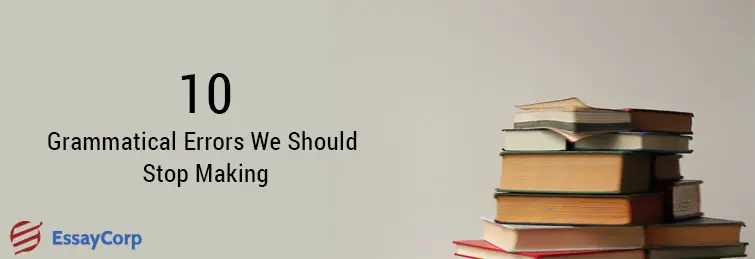We all have been learning grammar since our school days and many people still mess up. Making grammatical errors can make you look like a clown and also affect your effectiveness.
In this post, we are providing you 20 grammatical blunders and the correct usage of those words with complete understanding to avoid such mistakes in the future.
25 words commonly misused are:
1. Its vs. It’s
“Its” is a possessive pronoun and is used when something belongs to a thing which is non-living. While “It’s” is a contradiction of “it is” or “it has”.
Example :
- I bought a new car. Can you guess its color?
- It’s a mistake everyone can make.
2. They’re vs. There vs. Their
“They’re” means they are. “There” is used to refer to a particular place and “Their” is used to refer something which is owned by a group.
Example :
- They’re going for a trip.
- Please open that bag, which is lying over there.
- It is their responsibility to complete the project on time.
3. Your vs. You’re
“Your” is a possessive pronoun and “you’re” is a contradiction of you are.
Example :
- You’re a very hardworking student.
- I know your dad, he is a gentleman.
4. Affect vs. Effect
“Affect” is a verb and “Effect” is a noun. When we talk about the act of changing, we use “affect” and when we talk about the change itself, we use “Effect”.
Example :
- That story had a great effect on her.
- That story affected her greatly.
5. Then vs. Than
“Then” refers to the moment in time, while “Than” is used to denote a comparison between two things.
Example :
- He was giving the test then.
- Her cooking skills are better than yours.
6. Complement vs. Compliment
“Complement” is something that adds to or enhances something. While, “compliment” means something nice said about someone, it is an expression of praise or admiration.
Example :
- They will provide you complementary
breakfast. - He compliments for her beautiful dress.
7. Fewer vs. Less
“Fewer” is used for countable things and “Less” I used for uncountable things.
Example :
- She has fewer chocolates in her pocket.
- The amount of water is less I glass.
8. Historic vs. Historical
“Historic” means an important event and “Historical” means something that happened in the past.
Example :
- The venue of this historic event is yet to
decide. - She loves Historical monuments.
9. Principal vs. Principle
“Principal” means the main participant, most important or highest in rank. While “Principle” means fundamental law or truth.
Example :
- He is the Principal of our school.
- Please follow all the principle laws.
10. Peek vs. Peak vs. Pique
This is the most common mistake people usually do. “Peek” means taking a quick look at something. “Peak” means a sharp point and “Pique” means to provoke.
Rectify the above errors and try not to make them ever again because good grammar is the key to success



